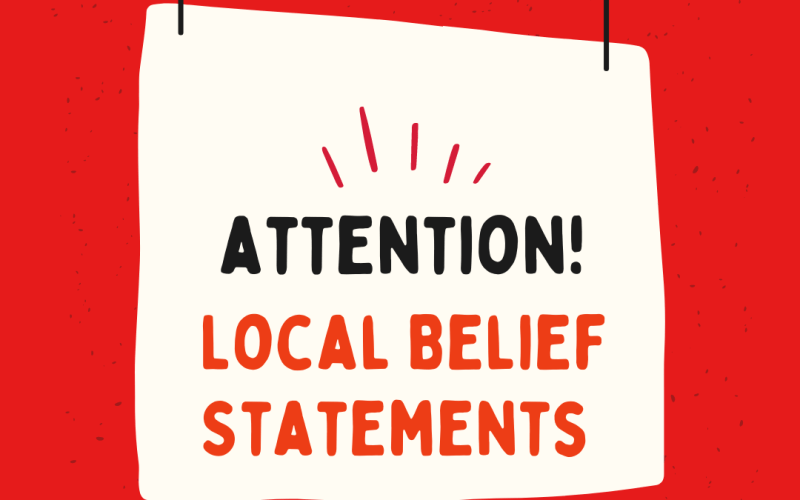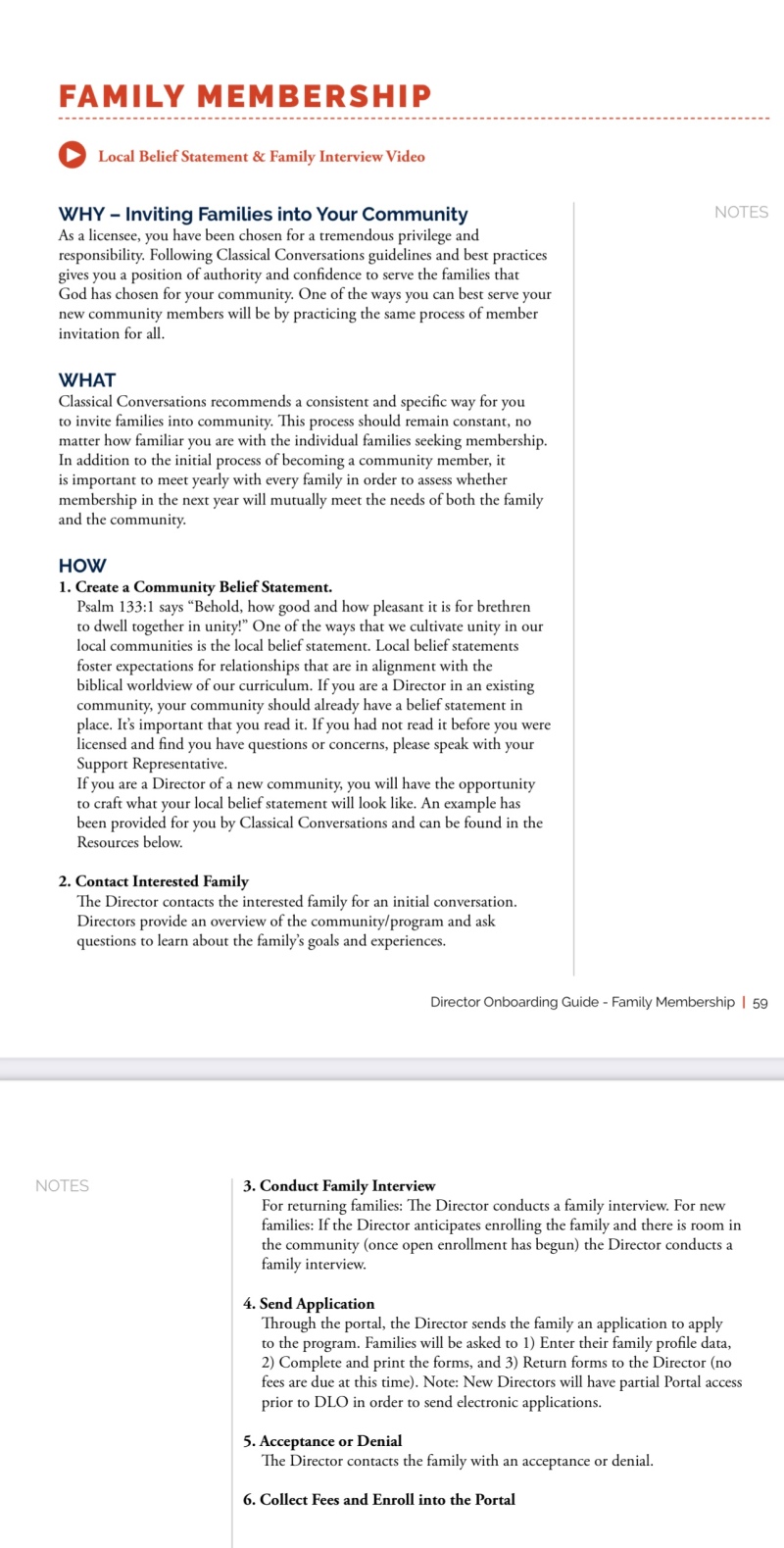Local Belief Statements, Directors, Customers, and Discrimination

Directors, Customers, and Discrimination
For several years I have been aware that across the country, leaders working for a certain company have been required to write a Local Belief Statement (LBS).
When I contracted with this company the LBS was simply an option, but one I strongly discouraged my team members from creating.
“But why wouldn’t I want to have a statement to clarify the beliefs of a community?,” you ask. “Am I ashamed of my faith?! Do I not want like-minded peers for my children?!“
Not at all.
I recommended against drafting a LBS because breaking (or even brushing against breaking) federal laws is something one should avoid!
Let me explain.
Directors are licensed business owners of a for-profit entity (colloquially called “the community”). This means that they have to operate their business in accordance with the law or they could receive consequences in the form of lawsuits or fines.
For-profit businesses are things like H&R Block, Planet Fitness, or mom and pop bakeries providing wedding cakes to the general public.
Title VII of the Civil Rights Act of 1964 prohibits discrimination in virtually every circumstance on the basis of race, color, RELIGION, gender, pregnancy, or national origin. Marketplace inclusion, granted by the Civil Rights Acts of 1866 and 1964, protects people from being denied service based on race, color, RELIGION, sex, or national origin.
Marketplace Inclusion is federally protected and applies to the families/customers of the service, no matter where they are located in the United States. Directors cannot legally offer or deny service (“joining the community”) on the basis of any one of these protected classes.

A Director is a for profit business owner providing a tutoring service to children. So it’s pretty bizarre that every year Directors are required by their corporate up line to conduct PARENT interviews of their current customers.
The service provided by the Director is for the KID, not the parent. The payment that changes hands is for the KID, not the parent.
It’s concerning to me – although admittedly it hasn’t yet been tested in a lawsuit – that every year Directors conduct these interviews using questions that put them at risk of a discrimination lawsuit. In many cases, as a condition to provision of service, families are asked to sign their adherence to the Local Belief Statements (or at minimum agree they will not say or do anything that contradicts the statement) during their weekly meetings.
Any questions during these interviews regarding the following topics should trigger some red flags from the federal law:
- Age or genetic information
- Birthplace, country of origin or citizenship
- Disability
- Gender, sex or sexual orientation
- Marital status, family, or pregnancy
- Race, color, or ethnicity
- Religion
- Height/Weight
- Financial Information
- Unemployed Status
- Background Checks
- Citizenship
- Medical Questions & Examinations
Yet according to the corporate issued instructions given to Directors, “Classical Conversations recommends a consistent and specific way for you to invite families into community. This process should remain constant, no matter how familiar you are with the individual families seeking membership. In addition to the initial process of becoming a community member, it is important to meet yearly with every family in order to assess whether membership in the next year will mutually meet the needs of both the family and the community…One of the ways that we cultivate unity in our local communities is the local belief statement. Local belief statements foster expectations for relationships that are in alignment with the biblical worldview of our curriculum.” (From 2022 Director On Boarding Guide.)
The very first item that the company recommends to help a Director decide whether a family is a good fit is a federally protected class: Religion.
Again, a for-profit business owner must follow the law. Directors are not religious organizations, religious associations, private clubs, or non-profit entities. They are owners of for-profit businesses that must not discriminate.
To begin an application process based upon discrimination is very, very risky when the average discrimination lawsuit results in penalties of $40,000-$50,000. (“Application process” isn’t even the right terminology because this isn’t a club membership, it’s legally a tutoring service that is offered to the public but here we are, once more trying to find the right vocabulary after the facts have been convoluted by the company.)
Similarly discriminatory, probing questions are often asked in the context of an Information Meeting to help families “find a good fit.” This practice could get a Director into very hot water!

Many have observed that the broiler plate Local Belief Statement reads more like a political statement with cherry picked Scriptural references than a sincere religious statement. Additionally, as you will read, the template identifies SEVERAL federally protected classes that should be a no-no for a for profit business owner to use as a litmus test as they consider to whom they offer their services.
Here is the text of the sample Local Belief Statement that the corporation recommends:
Local Belief Statement – Sample
Please remember the first and primary document to review with enrolling or reenrolling family is the CC Statement of Faith. The Local Belief Statement is a local document to share the expectations of how the CC Statement of Faith manifests relationally in community as we uphold the mission, model, and method.
At _______________community, our mission is to know God and to make Him known. We accomplish this by educating ourselves and our children through the classical model of education combined with a Biblical worldview. “The true purpose of education is to know God…through our studies of His creation and to build the skills needed to make Him known to the world.” (Matt 22:37, Matt 28:19-20, Prov 9:10, Prov 24:3, Lk 2:40) (1) This document serves as guidance to understanding the foundational beliefs of_______________community.
Local Belief Statement
We strive to align all Classical Conversations materials and dialogue with a biblical worldview. An individual’s worldview shapes a person’s thinking and is reflected in word and deed, whether consciously or unconsciously.
• We believe that God offers redemption and restoration to all who confess and forsake their sin, seeking His mercy and forgiveness through Jesus Christ. We believe that every person must be afforded compassion, love, kindness, respect, and dignity. Hateful and harassing behavior or attitudes directed toward any individual are to be repudiated and are not in accord with Scripture or the community policies. (Mk 12:28-31; Lk 6:31, Acts 3:19- 21; Rom 10:9-10; 1 Cor 6:9-11)
● We believe that the Bible commands Christians to make every effort to live at peace and to resolve disputes with each other in private or within the Christian community in alignment with the biblical injunctions of 1 Corinthians 6:1-8, Matthew 5:23-24, and Matthew 18:15-20.
● We believe that all human life is sacred and created by God in His image. Human life is of inestimable worth in all its dimensions, including pre-born babies, the aged, the physically or mentally challenged, and every other stage or condition from conception through natural death. We are therefore called to defend, protect, and value all human life. (Psalm 139:13-16)
● We believe we are united as the Body of Christ beyond personal opinions, doctrines, or denominations. We strive to preserve this unity by showing respect to each other as well as the host facility. (1Cor 12:12-31, Romans 12: 4-5, Eph. 2: 19-22)
● We believe parents have a God given authority over their children both academically as well as in Biblical teaching, character building, and correction. (Proverbs 22:6, Eph 6:4, Deut 11:19, 1 Tim 3:4, Proverbs 29:17)
● We believe children have been given the Biblical instruction to submit to the authority of their parents and those their parents have put in authority over them when in community. (Eph 6:2-3, Col 3:20)
● We also believe in honoring those given the stewardship of leadership. This includes facility staff, all community directors, fellow community members. (Hebrews 13:17, 1 Peter 2:13-25)
● We believe that God wonderfully and immutably creates each person as male or female. These two distinct, complementary genders together reflect the image and nature of God. Rejection of one’s biological sex is a rejection of the image of God within that person. Gender identity is determined by biological sex and not by one’s self-perception – a perception which is often influenced by fallen human nature in ways contrary to God’s design. (Gen 1:26-27, Ps 139:13-14, Rom 1:19-25, Eph 4:17-18)
● We believe this country was built on Biblical principles and want to honor and show respect and appreciation by pledging to the American flag each week. (Psalm 33:12-22, Romans 13:1-5)
● We believe that the term “marriage” has only one meaning: the uniting of one man and one woman in a single, exclusive union, as delineated in Scripture. We believe marriage between one man and one woman for life uniquely reflects Christ’s relationship with His Church, and that marriage serves as the foundational unit of a stable society (Gen 2:18-25, Matt 19:4-6, Eph 5:21-33, 1 Cor 6:14, 7:2, Titus 1:6).
● We believe the Bible calls us to love our neighbors more than ourselves. This applies to children, young adults, and parents. One way to do this is by dressing modestly when at community. We do not want to cause a “brother to stumble” or offend those around us by our wardrobe. ( 1 Cor 6:19-20, 1 Cor 10:31, 1 Cor 8:9)
One question many have about the Local Belief Statement is:
If the LBS is so important to the corporate up line, why can’t Directors simply use the Statement of Faith provided by the parent company with whom they are licensed to Direct? Why do they have to create their own?
I honestly can’t answer. But my suspicion is that, after the Director(s) creates a Local Belief Statement, liability for the discrimination moves from the parent company onto the licensee (Director).
Because this company has a track record of denying involvement on a local level (remember, “The company doesn’t meet in local churches (putting the property tax exemption of the church at risk because they are hosting for profit businesses in their buildings every week), homeschooling moms meet in local churches.”), my strong hunch is that in the case of a discrimination lawsuit the official party line will be that “corporate didn’t make that discriminatory statement of faith, the local Director did!”
Local Directors will be out on a limb without support. Again.
Please tell me what normal homeschooling mom, running around and balancing All. The. Things. wants to deal with a Discrimination LAWSUIT (or has deep enough pockets to pay for it) because of a Local Belief Statement they don’t really need and Family Interviews that just take up the time they need to be doing other things each spring?
I’m waiting.
